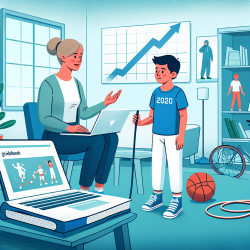Introduction
In the ever-evolving field of child therapy, practitioners are constantly seeking ways to improve their skills and outcomes for their young clients. A recent study titled "How low can you go? Examining the effects of brief online training and post-training consultation dose on implementation mechanisms and outcomes for measurement-based care" offers valuable insights into how online training and consultation can enhance the implementation of measurement-based care (MBC) in educational settings. This blog will delve into the findings of this research and explore how practitioners can leverage these insights to improve their practice.
Understanding the Study
The study focused on the effects of brief online training (BOLT) and varying dosages of post-training consultation (PTC) on the implementation of MBC practices among clinicians providing mental health services in schools. The research aimed to determine the optimal consultation dosage necessary to produce desired outcomes and engage theoretical implementation mechanisms such as provider knowledge, skills, and attitudes.
A national sample of 75 clinicians was randomly assigned to either the BOLT+PTC or control group, with further randomization into 2-, 4-, or 8-week consultation conditions. The study measured self-reported MBC knowledge, skills, attitudes, and use over 32 weeks using multilevel models to analyze the data.
Key Findings
- There was a significant linear effect of BOLT+PTC over time on standardized assessment use and a significant quadratic effect on individualized assessment use, but no significant effect on treatment modification.
- BOLT+PTC resulted in higher MBC knowledge and larger growth in MBC skills over the intervention period compared to the control group.
- PTC dosage levels were inconsistently predictive of outcomes, indicating no clear evidence for the added benefit of higher PTC dosage.
Implications for Practitioners
These findings suggest that online training and consultation can effectively enhance certain MBC practices among clinicians. Practitioners can consider integrating brief online training programs into their professional development to improve their knowledge and skills in MBC. However, the study also highlights the need for further research to determine the optimal consultation dosage and explore other potential mechanisms that could enhance MBC implementation.
Practitioners should also be aware that while online training can improve assessment practices, it may not necessarily lead to significant changes in treatment modification. This underscores the importance of ongoing research and adaptation of training programs to address this gap.
Conclusion
The study provides valuable insights into the potential of online training and consultation to improve MBC practices in educational settings. By leveraging these findings, practitioners can enhance their skills and ultimately improve outcomes for children receiving mental health services in schools. As the field continues to evolve, ongoing research and adaptation of training programs will be crucial to ensuring that practitioners have the tools they need to succeed.
To read the original research paper, please follow this link: How low can you go? Examining the effects of brief online training and post-training consultation dose on implementation mechanisms and outcomes for measurement-based care.










